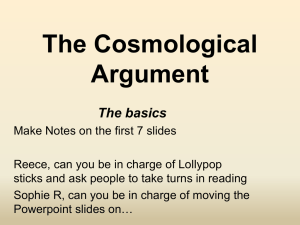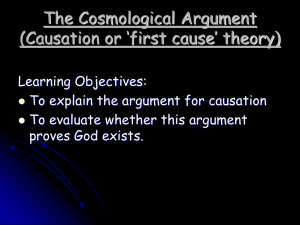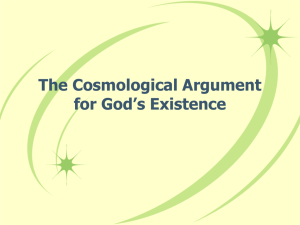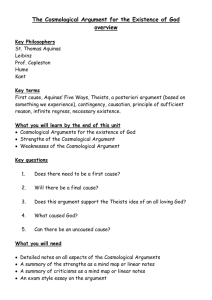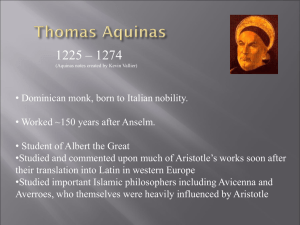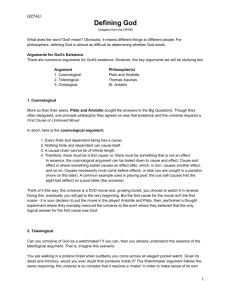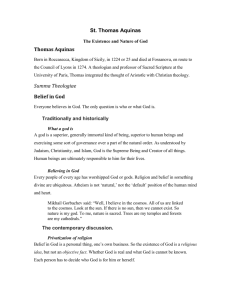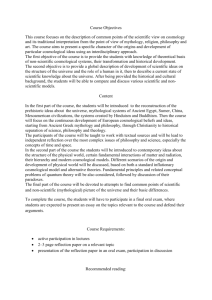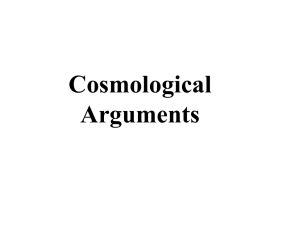Critically assess the Cosmological argument for the existence of God
advertisement
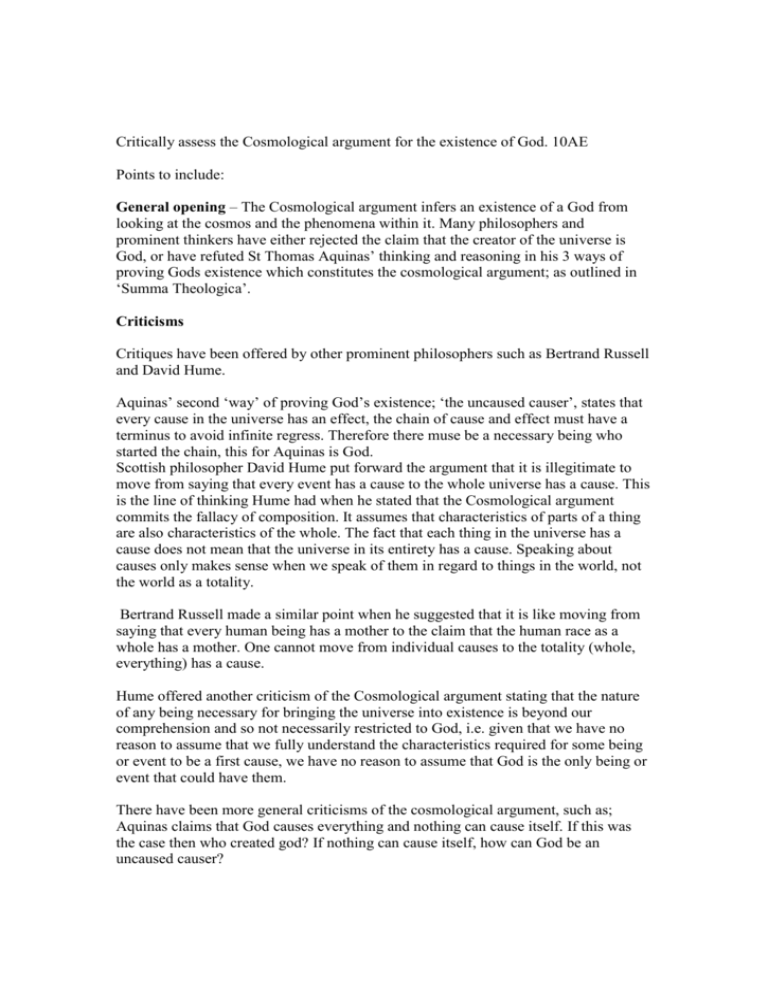
Critically assess the Cosmological argument for the existence of God. 10AE Points to include: General opening – The Cosmological argument infers an existence of a God from looking at the cosmos and the phenomena within it. Many philosophers and prominent thinkers have either rejected the claim that the creator of the universe is God, or have refuted St Thomas Aquinas’ thinking and reasoning in his 3 ways of proving Gods existence which constitutes the cosmological argument; as outlined in ‘Summa Theologica’. Criticisms Critiques have been offered by other prominent philosophers such as Bertrand Russell and David Hume. Aquinas’ second ‘way’ of proving God’s existence; ‘the uncaused causer’, states that every cause in the universe has an effect, the chain of cause and effect must have a terminus to avoid infinite regress. Therefore there muse be a necessary being who started the chain, this for Aquinas is God. Scottish philosopher David Hume put forward the argument that it is illegitimate to move from saying that every event has a cause to the whole universe has a cause. This is the line of thinking Hume had when he stated that the Cosmological argument commits the fallacy of composition. It assumes that characteristics of parts of a thing are also characteristics of the whole. The fact that each thing in the universe has a cause does not mean that the universe in its entirety has a cause. Speaking about causes only makes sense when we speak of them in regard to things in the world, not the world as a totality. Bertrand Russell made a similar point when he suggested that it is like moving from saying that every human being has a mother to the claim that the human race as a whole has a mother. One cannot move from individual causes to the totality (whole, everything) has a cause. Hume offered another criticism of the Cosmological argument stating that the nature of any being necessary for bringing the universe into existence is beyond our comprehension and so not necessarily restricted to God, i.e. given that we have no reason to assume that we fully understand the characteristics required for some being or event to be a first cause, we have no reason to assume that God is the only being or event that could have them. There have been more general criticisms of the cosmological argument, such as; Aquinas claims that God causes everything and nothing can cause itself. If this was the case then who created god? If nothing can cause itself, how can God be an uncaused causer? There has been a general response to this criticism, it is stated that the cause of the universe must lie in something outside of it. Thus Aquinas saw God not as another thing but something bigger; he is of totally different order and not subject to the same conditions as the universe, and therefore does not have a cause or he may have caused himself. It has also been argued that why does Aquinas’ three ways have to lead to only one cause? Could it not be the case that there are many causes, if we follow religious thought, could there not be many causes who were gods and thus follow polytheism (worship of many gods) and not monotheism (worship of one god) as Aquinas’ argument suggests. Aquinas’ three ways of proving God’s existence all lean toward the Christian idea of God, could it not be Allah who created the universe? Or a Hindu god, such as Shiva? Aquinas’ reasoning does not guarantee a singular Christian God as the cause of the universe. Aquinas’ argument also implies that god is in the here and now, the causer of movement and cause and effect. But it could also be the case that if God did create the universe he may have ceased to be. Strengths Although the Cosmological argument has been heavily criticised, it does have some strengths. One such strength is that the cosmological argument appeals to our common sense. We can from past experience say that nothing is without a cause. Everything that we know in this world we can attribute a cause to it, for example a building has a cause in the sense that we built it, the rain has a cause in the pressure and temperature in the clouds. Therefore it is not unreasonable to assume that the universe has a cause as we perceive everything else to. It is also the case that Infinite regress does seem impossible; how could something exist now if the process leading up to it literally never started? The cosmological argument does not contradict the monotheistic idea that God is the cause of the universe, a fact that some would see as a strength of the argument. Furthermore, the argument is emotionally and aesthetically appealing because believers feel the cosmos to be non accidental and beautiful. Which again is consistent with the idea of a created cosmos which monotheism teaches. Conclusion It seems in this sense that the criticisms of the cosmological argument outweigh the strengths; however this does not take away from the fact that it is an intriguing and thought provoking attempt of trying to prove the existence of a God. An attempt which will continue to attract believers and sceptics.

